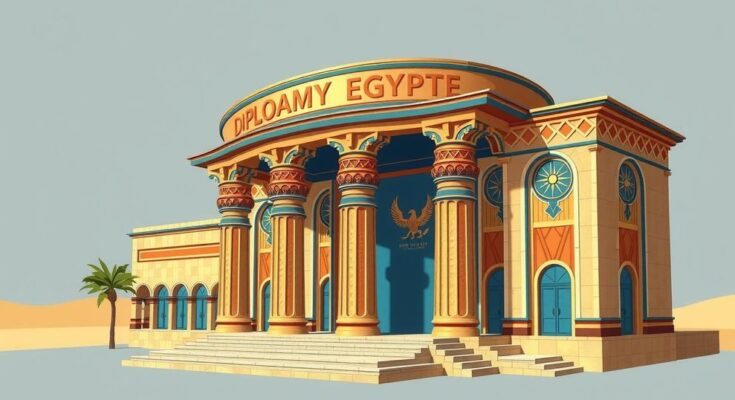The Arab League’s Emergency Summit in Cairo adopted a $53 billion Egyptian reconstruction plan for Gaza, emphasizing Arab strategy for recovery contingent on a ceasefire. The Cairo Declaration builds on prior proposals and seeks to unify Palestinian factions while addressing governance issues. However, its implementation requires Israeli cooperation, amid ongoing settlement expansions, complicating the viability of a two-state solution.
On March 4, 2025, an Emergency Summit of the Arab League convened in Cairo, where a significant Egyptian proposal for Gaza’s reconstruction was adopted. This plan, amounting to $53 billion, is seen as a comprehensive Arab strategy following Israel’s cessation of humanitarian aid to Gaza post the Israel-Hamas Agreement’s initial phase. The Cairo Declaration outlines Arab efforts for Gaza’s post-conflict recovery, contingent upon Israel’s adherence to the ceasefire agreement.
The Cairo Declaration builds on the Bahrain Declaration from the previous Arab League Summit in May 2024. It suggests the establishment of a Gaza administration committee composed of qualified Gazans during a transitional period, along with a trust fund for recovery projects. Furthermore, it reiterates the call for UN peacekeeping forces in the region, while endorsing a two-state solution as consistent with prior Arab League positions initiated by the 2002 Arab Peace Initiative.
Furthermore, the Declaration emphasizes the necessity of uniting all Palestinian factions under the Palestine Liberation Organization (PLO), which currently does not account for Hamas. It notably omits any direct mention of Hamas, arguably allowing for its continued presence during the interim. Both Israel and the United States have criticized this aspect of the Summit’s outcomes, viewing the lack of reference to Hamas as problematic.
The proposed interim administration aims to prepare for the Palestinian Authority’s eventual reclamation of governance. It is possible that Hamas may feel encouraged by the prospect of new elections, following its previous majority in the 2006 elections. However, concerns linger regarding the implications if Hamas were to regain electoral power.
The Declaration further rejects any notion of “ethnic cleansing” and acknowledges the important roles of Jordan and Egypt in addressing Palestinian displacement, countering previous suggestions for them to absorb Gaza’s displaced population. It also necessitates Israel’s complete withdrawal from Gaza as a critical condition for sustaining the ceasefire.
For peace in Palestine to be realized, Israeli military actions must cease, followed by an agreed-upon reconstruction and governance system involving all stakeholders, including Hamas. The Cairo Declaration serves as a foundational document, yet its enactment is contingent upon Israeli cooperation, which currently appears elusive.
While reaffirming commitment to a two-state solution, the prospect of actualizing it remains grim, especially given the ongoing expansion of Israeli settlements, which has been linked to diminished hopes for a viable Palestinian state. The Israeli settler population’s growth complicates the implementation of peace strategies as articulated in the Declaration, blending aspirations for Gaza’s revitalization with the stark realities of on-ground political dynamics and settlements.
In summary, the Cairo Declaration represents a critical Arab initiative for Gaza’s reconstruction, emphasizing Palestinian unification and a two-state solution. This response to President Trump’s controversial proposals highlights regional commitments to Palestinian governance and recovery, yet its success hinges on Israeli cooperation and a cessation of settlement expansion. The juxtaposition of two differing visions for Gaza’s future underscores the complexities inherent in the Israeli-Palestinian conflict and the challenges that lie ahead in achieving lasting peace.
Original Source: indianexpress.com




